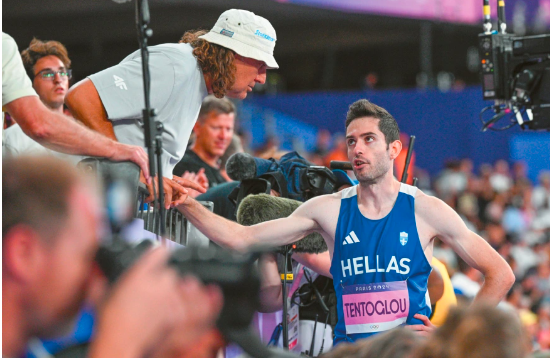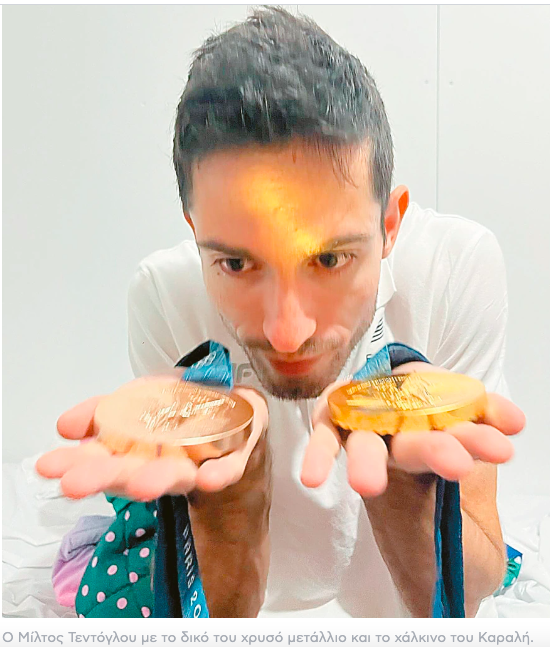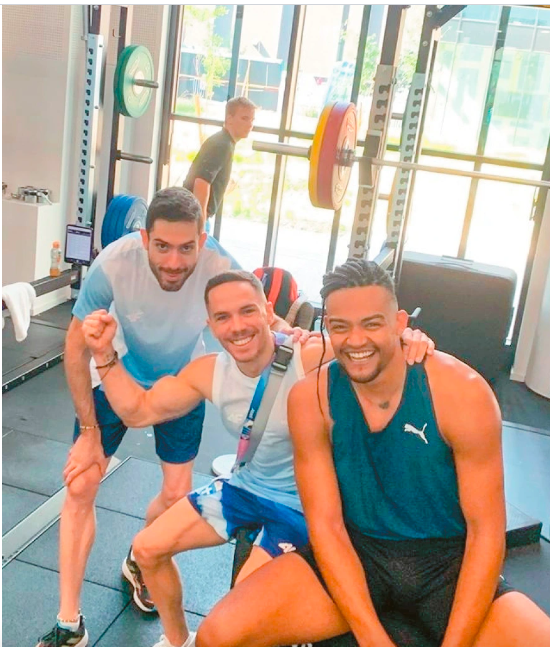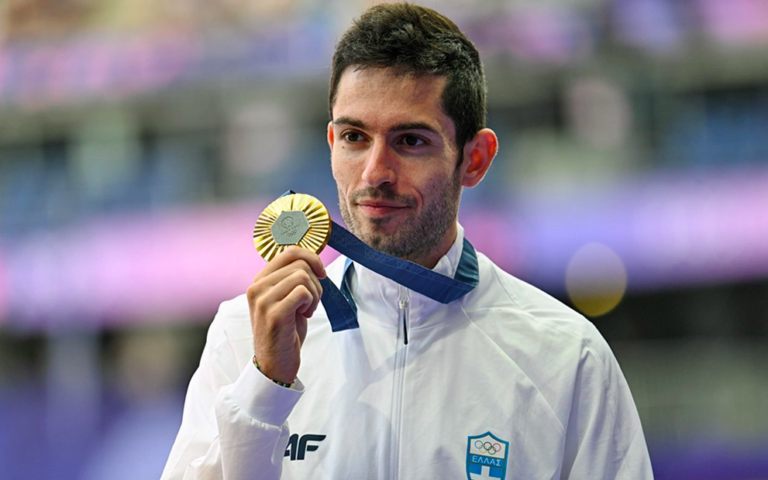August 2016, Rio. A bus full of athletes and coaches departs from the Olympic Stadium heading to the Olympic Village, among them an 18-year-old slender Greek.
Earlier, he had participated in the qualifying round of his event without making it to the final. But for that kid, who had only started taking sports seriously two years prior, what he was experiencing was magical. Having traveled alone to Brazil because SEGAS decided his coach wasn’t needed (even though just months before the Games, he almost set a Junior World Record), he was enjoying every moment when he felt a hand on his shoulder…
“Do you know who that is?” asked the long-haired man, and after he nodded affirmatively, his face lit up because the question was about his idol: the incredible Cuban long jumper Iván Pedroso. This brief dialogue between Giorgos Pomaski (the long-haired man) and Miltos Tentoglou (the kid) sparked a partnership that has brought Greece countless proud moments and created a new modern legend in athletics.
August 2024, Paris. An entire stadium stands and applauds Miltos Tentoglou seconds after winning his second consecutive Olympic gold medal, making him the second to do so after the great Carl Lewis (who won four consecutive golds from 1984 to 1996 in the same event).
And the dialogue between the two protagonists is just as short, as the one eight years ago, but so revealing of the special relationship they have developed, “changing” each other and… reaching new heights each time.
“I wasn’t good,” Tentoglou said, lost in the embrace of his coach, who hadn’t stopped laughing with joy and pride, to which Giorgos Pomaski replied: “It doesn’t matter; we got it for the second time.”
Even though Tentoglou still admires and watches his idol’s jumps (Pedroso is now a coach in Spain), now, on the bus that takes athletes to and from the Olympic Village, the young athletes’ eyes are fixed on him, and their coaches lean in conspiratorially and whisper, “Do you know who that is?”

Parkour
When coach Vangelis Papanikos first saw him doing parkour at the Grevena Municipal Stadium, he thought he was older. “He was tall and skinny, and when he told me he was 15 years old, I suggested he take up track and field, but he said, ‘No, I don’t want to.’ I insisted, though, and told him, ‘Where will you do parkour in the winter, in the cold? Come here where we have an indoor facility.'” He started coming sporadically, initially doing high jump, clearing 1.65m and 1.70m, but we quickly decided to focus on the long jump,” recalls his first coach, who realized he had a rough diamond on his hands, but his biggest challenge was keeping him in the stadium…
“He disappeared for a while and returned in late February. In the spring, he participated in his first competition, which was a heptathlon. He won first place, even though his best long jump was 5.85m. That summer (2014), we went to Thessaloniki for the Panhellenic Youth Championship, where he took 2nd place with a jump of 6.40m. After the competition, he told me, ‘Coach, I liked it, and I promise to attend all the training sessions from next year.’ I asked him if he meant it, and he left no room for doubt…
In September, when he returned from Germany, where he had gone to visit his father, he was indeed at the field, and after that, everything fell into place.”

Two months after the Rio Olympics ended, they met in Grevena—the then national track coach Yiannis Koutsioras, Vangelis Papanikos, Miltos, and his mother—to decide his future.
Mr. Papanikos couldn’t and didn’t want to leave Grevena, and five potential coaches were discussed to take over Miltos once he moved to Athens. Before they even had the chance to mention all the candidates, Tentoglou, in a tone that left no doubt, announced that he would work “only with Pomaski.” The die had been cast.

The Move to Athens
“The best should train with the best, in the best facilities for both the athlete and the coach,” said Mr. Papanikos during a SEGAS seminar, explaining simply and understandably why Miltos moved to Athens, which coincided with a change in his technique (a 2.5-stride jump) that he started testing right after Rio. Very similar to Pedroso’s. And even though it initially produced lower results… both the former and current coach knew this was the path to success.
Coexisting with Pomaski was a significant challenge for both. The Bulgarian coach, who came to Greece in 1988 because of his wife Eva Nikolaou, had a track record of successful partnerships but was also known for being tough. Absolute. Yet this kid, who was hard to fit into any mold, managed to transform even the tough Pomaski, forcing him to reconsider a significant part of his coaching approach, as the Bulgarian coach has admitted.
That doesn’t mean Pomaski goes easy on Tentoglou, or that the latter slacks off. After all, no athlete could win 2 Olympic gold medals and another 10 medals in European and World Championships by slacking off.
However, Tentoglou’s comment, “I’m a bit lazy,” and other remarks like “I don’t like weights” or “I did very few jumps” in previous weeks created the impression of complete relaxation, which couldn’t be further from the truth.
“Sometimes I ‘pamper’ him… I don’t train him; I maintain him. His body can’t take much strain. If I do that, I’ll break him. But he uses his body so well that he doesn’t need to rely much on other parameters,” Pomaski said in an interview with gazzetta.gr, adding with meaning: “He’s the most disciplined of them all, and he’ll do the training he needs to do. Miltos’ execution in training is at 120%, so I have to reduce the volume of training.” So why is Miltos “lazy”? Because something he doesn’t like doing, he won’t do… For example, he might leave the dishes unwashed, order food instead of cooking (even though he likes barbecuing), or choose to stay home to watch a movie or play his favorite video games instead of going out. But there’s a big difference between being “lazy” and being “lazy”…
His Standards
When Miltos lost the gold medal at the 2022 World Championships in Eugene, Oregon, in the USA, in the last jump (China’s Wang did 8.36m, leaving him second with 8.32m), in his statements, he didn’t look for excuses. “It’s a shame I lost it in the last jump, but it would have been a disgrace to win with 8.32m,” he said, causing yet another cultural shock!
This is the only final he’s lost since 2017, but it also shows how he thinks and operates. That final stayed with him for another reason: the tweet by the legendary Carl Lewis, who expressed his disappointment with the level of the long jump today. Tentoglou respects all the old jumpers immensely, but he won’t accept being questioned and having his pride hurt.
Yes, Carl Lewis was a super athlete, but he won his first gold in the long jump in 1984 in Los Angeles at the age of 23 with a performance of 8.30m. Miltos won it at the same age in Tokyo with a performance of 8.41m.
Now he wants to prove to Lewis and others that he deserves a place in the pantheon of the event, and that will come with the big jump he’s chasing obsessively. So after leaving Paris having achieved his main goal of the year, he has already set his mind on his next leap.
Yes, Tsatoumas’ national record is a goal to be able to tell his first coach, “Coach, we’ve erased that too,” but his main goal is a jump of 8.75m. To prove to everyone that he doesn’t win because there’s no strong competition but because he’s one of the best of all time.
This isn’t arrogance, as some might quickly say, but the internal driving force that pushes him to exceed his limits each time. Because otherwise, Miltos remains the same humble and genuine character he’s shown to be from the start.
And although it’s still early to talk about Los Angeles and the 2028 Olympics, let’s remember that he once said, “I’d like to reach Pyrros Dimas’ three golds.” Honestly, is there anyone who believes that this kid from Grevena, if he sets his mind to it, won’t succeed?
Ask me anything
Explore related questions





